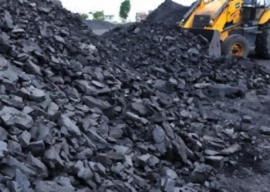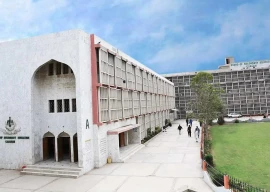
It has also restrained the Sindh government from transferring any of the nine members of the task force set-up to ensure the implementation of the commission's recommendations without completing their three-year of service on their current posts.
The government can only appeal against any direction or order passed by the judicial commission to the apex court, while the transfer of the task force's members can only be done with the permission of the SC.
These directives and orders were contained in a 64-page interim order issued by the apex court on Friday. A three-member bench, comprising justices Amir Hani Muslim, Qazi Faiz Isa and Faisal Arab, passed the order after hearing a weeklong hearing on a petition regarding non-supply of clean drinking water, deteriorating sanitation conditions and its impact on the environment at the SC's Karachi Registry.
Judicial commission seeks reports on solid waste management
In its verdict, the apex court expressed concern over the state of affairs in the province in regards to the functioning of the public departments and agencies, which were supposed to perform their duties in the supplying clean drinking water to the masses, improving deteriorating sanitation conditions and reducing the impact on the environment.
Therefore, it directed the office to send copies of the 64-page interim order to the speaker of the Sindh Assembly with a CD containing petitioner's evidence and the observations made in order.
"We are clear in our mind that the commission comprising Justice Muhammad Iqbal Kalhoro appointed pursuant to our direction by the chief justice of Sindh High Court shall continue to work with all such powers conferred on it by this court in terms of the order dated December 27, 2016 as the issues in these proceedings have direct impact on the life and health of the public of Sindh," observed the judges in the order.
The apex court ordered that the commission will ensure compliance of the directions contained in its interim order and will also take steps to see that the task force constituted by the Sindh government in pursuance of the court's March 14 order will comply with its recommendations contained in the report.
Potable water and sanitation: Judicial commission finds fault with reports
It further ordered that the commission will be at liberty to pass orders as a high court judge, whenever necessary in the interest of the public for achieving the objective for which it has been constituted. All the provincial and federal government departments and statutory bodies, agencies, companies under their patronage will be bound by the directions and orders issued by the commission.
The commission, in addition to the task force or committee, may seek information or any details regarding water or sanitation problems in any part of the Sindh.
All the persons and authorities concerned were directed to periodically submit their reports to the commission to ensure that the matters highlighted in the commission's report are addressed.
The apex court said the provincial chief justice may ensure that Justice Kalhoro has the requisite time to undertake this important assignment. The commission will also document, photograph and film the prevailing state of affairs and improvements brought thereto in a systematic manner.
Any expense borne by the commission to undertake the task will be borne by the Sindh government, the SC ordered.
"Since the issues dealt with by the commission under the orders of court pertain to life and health of the common people of Sindh, therefore it is imperative that the power of the commission be ensured without being impugned by procedural technicalities," the SC observed.
Environmental hazard: Judicial commission inspects toxic water disposal in Kotri
Therefore, it held that any order of the commission cannot be appealed before any forum except the SC and would be binding on all the provincial and federal government departments and agencies under their control unless reversed or reviewed by the SC.
In its order, the SC recorded its appreciation for the hard work undertaken by Justice Kalhoro in conducting the proceedings of the commission and compiling a report.
Task force
The court, in view of the tendency of frequent transfers and postings in the Sindh government in defiance of the service rules, restrained the Sindh government from posting out either the chief secretary and/or any of the members from his office, as reflected in the notification, without prior approval of the SC, unless a member's three years tenure was completed, as any other intervention by way of transfer by the Sindh government will hamper the functioning of the task force.
It ordered the task force to directly report to the commission, which will be at liberty to hold proceedings in order to examine improvements in the departments/organisations on the issue of water.
Adjourning the hearing for four months, the apex court directed the commission to submit its report on the directives to the court.

















COMMENTS
Comments are moderated and generally will be posted if they are on-topic and not abusive.
For more information, please see our Comments FAQ